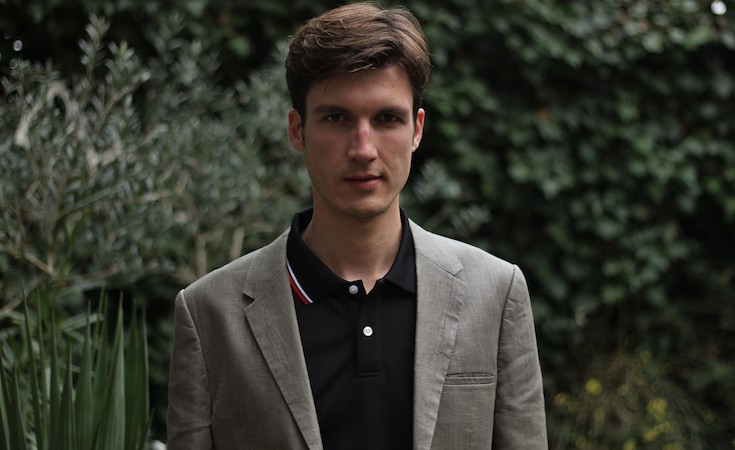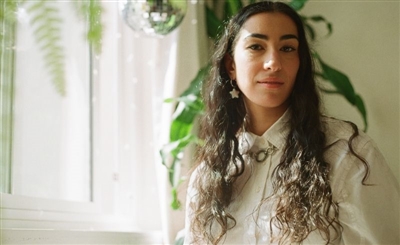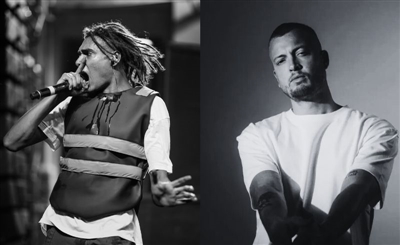Alexandria-Based Musician Rorik Dupuis on Politics in Art and Experiencing Egyptian Culture
We sit down with Alexandria-based French-German musician Rorik Dupuis who opens up about his experiences in Egypt, his music, and the aberrant effects business and politics have on art.

Sometime last year, we learned of a French musician living in Alexandria, who works at a French school. His music is unlike anything we have heard before; a sincere portrayal of profound emotions, very touching, but also very entertaining. We were greatly impressed by his last album Marches Égyptiennes, which as the title implies, was influenced by the artist's stay in our country. Dupuis lived his life between the Périgord region in France and Germany. Born half French/half German, Dupuis found in himself a cross section of different cultures. He studied piano in Paris, and after dabbling in music for some time, Dupuis took up teaching. Yet, music, it seems, still plays a huge role in his daily life. After realising the immense musical genius we have in our midst, we reached out to him for an interview. What was your first impression upon arriving to Alexandria?
What was your first impression upon arriving to Alexandria?
My first impression upon arriving to Alexandria - before poverty, dirt, or the insane traffic - was the beauty of the faces and the intensity of people's looks, but maybe this is my aesthete nature. There is something noble and magnetic in the Egyptian phenotype, fineness, and regularity of features, their piercing eyes, the infinite shades of bronze reddish complexion, jet black hair, dense and silky, with tints of silver. An admirable and mysterious harmony; their gait which displays a blend of modesty and determination, a form of brute elegance that immediately attracted me.
Walking here and there, I meet these young slender people, children and teenagers with stunning pharaonic beauty, shrouded in golden Middle Eastern light, watching you with this disturbing air, with equal measures of insistence and timidity. This keen and resourceful youth is so nice to see. I retain these faces, these gaits, these voices, their distinction, their depth, their wild, and silent charm.
What are some of the things you found to be contrary to Western values in Egyptian society?
It’s a society that places great importance on the education of its children. I am very sensitive to that, since I work here as a teacher in a French school. Educating these new generations is a great responsibility: which values, which culture and which spirit do we want to pass on?
We are here, far from the social comedy and the neurosis of western society. Time and priorities are not the same here, and people still have a sense of true values: helpfulness, fraternity, and sincerity, which I find very reassuring and impressive. It also inspires hope that this radiant civilisation will preserve itself from neocolonialism and the vices of globalisation. We feel that Egypt is a changing country, full of contrasts, where the majority of people try to survive, while the others, a handful of nouveaux riches – from this universal arrogant and uneducated class – lay down the law.
What is one thing that you really like about being in Egypt?
I have a particular fondness for the people who spontaneously welcomed me with curiosity.
What is one thing that you don’t like about being in Egypt?
I feel somewhat like an exile. France is a country that is doing badly at the moment, a country governed by a sadistic Parisian oligarchy that is imposing more and more aberrant things, disconnected from any practical reality and disregarding people's concerns, for the benefit of minorities and powerful few. But this cannot last forever. So does this mean that you don’t really like France?
I love France, its regions, its traditions, its women too, but what it is becoming saddens me. I had the chance to grow up in a dual culture, my father is French and my mother is German, which allows me to step back from my country. I distinctly recognise in myself the French spirit and the German one, it gives a kind of manic romanticism, with desires of justice and grandeur, this is an interesting case to treat.
Tell us about your early years, your upbringing.
I grew up in the countryside, in the south-west of France, then went up to Paris to study and work, like many young people. I understood that it was going to be complicated, that you had to arm yourself with courage and patience.
How do you see the art scene in France?
There are - in French show business - well organised lobbies that deprive talented artists of expressing themselves, in aid of the protégés of their cliques, sustained by subsidies and media collaboration. That’s how mediocrity and perversity officially reign in artistic creation. That’s how communitarianism destroys any form of independence and merit. Why is there so much crap in the music scene and the film industry being imposed today? Not because the genie ran out or that it was better before, but because lobbying and profit have replaced the simple taste for fine work. Whoever frequents artistic circles or has a little common sense, knows that all of this is very consanguineous.
There is nothing more rotten than the world of production. I studied filmmaking, originally, I wanted to become a film director. For me, cinema was the synthesis of different arts that I love: writing, visual arts, and music. As a teenager, I was fascinated by the films of Wenders, Antonioni, Bergman, Tarkovski, but I abandoned the idea when I saw how it worked, it disgusted and discouraged me. I prefer a more solitary path. Fortunately, today, the Internet is a great tool when you have a minimum of curiosity and critical thinking.So how does music differ from cinema, or in better terms, why did you choose music?
I chose to dedicate myself to music, first, because it’s an aesthetic need. The music always accompanied me, but also because it allows me to concentrate. I'm someone quite agitated, I have trouble staying still. I always need to be on the move, to walk here and there, without a specific purpose. For example, I have never been fit for University studies, because, for me, it’s related to submission - and it’s also perhaps why I chose to work in the domain of teaching and education.
I always had a need for independence, for creation, and improvisation as a way of life. To come back to music, in my pieces, all the piano parts are improvised, there is nothing written, nothing premeditated. I guess it has to do with a certain idea of freedom. I like this duality between a repetitive haunting rhythmic section and the impulsiveness, the inconstancy of the piano.
Do you believe that music - like cinema - can help change the world?
I believe in the power of music, in its restorative and stimulating function. They may be only sounds, but their assembly and mastery - the harmony - produces something mysteriously beneficial to the mind and behaviour that is quite difficult to explain. These are the riddles of beauty and its influence on us.
I owe much to music, and it’s through it that I want to express things - I am not very talkative by nature. I consider my music as a form of walking, a permanent pursuit, with encounters, trials, hopes, and struggles.
What else plays an important role in your life, what else affects you greatly?
Another element that is important to me and that has always accompanied me is the sea. The sea has something formidably stimulating and soothing at the same time, it’s fascinating. It has, in some way, the same effect on me as music.
Lately, it seems you have been focusing more on electronic music production, is there a reason behind this?
Electronic music is a material that can be manipulated and modulated to infinity, it offers a quantity of sound possibilities and harmonic combinations, it’s so exciting for a composer. And the most beautiful form recognition is that some people find themselves in your art and derive from it any source of satisfaction or strength.
Follow Rorik Dupuis on Bandcamp here for his full discography and for updates on future releases.
- Previous Article Getting Abyusif
- Next Article DGTL: Much More than a Music Festival
Trending This Month
-
Apr 14, 2025






















